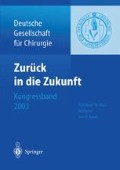Summary
Introduction. A clinical study on efficacy and tolerability in wound healing was carried out on patients receiving meshed skin grafts in parallel groups (PVP-I Liposome Hydrogel vs. Jelonet gauze).
Methods: 160 patients with fresh, primarily not infected mesh skin grafts were enrolled in parallel groups: 80 patients were treated with PVP-I Hydrogel, 80 patients with Jelonet gauze. Methods of analysis included clinical assessment, photoplanimetry, impedance measurement and the bacterial colonisation of the wound.
Result: The rate of wound epithelialisation was significantly improved. A better microbicial activity and tissue tolerability of the PVP-I Hydrogel compared to Jelonet was shown.
Conclusion: The PVP-I Liposome Hydrogel combines microbicial and wound-healing activities resulting in enhanced epithelialisation.
Zusammenfassung
Einleitung: In einer randomisierten offenen Phase III Studie wurden insgesamt 160 Patienten, welche Meshgraft Transplantate erhielten, aufgenommen. Untersucht wurde die Geschwindigkeit der Reepithelialisierung sowie die bakterielle Besiedlung der Transplantate. Eine Gruppe wurde mit PVP-Jod Liposomen Hydrogel behandelt, die andere mit Jelonet Fettgazen.
Methode: Die Geschwindigkeit der Reepithelialisierung wurde photoplanimetrisch bestimmt, ferner wurden regelmäßig Abstriche entnommen und die Transplantate klinisch beurteilt. Impedanzmessungen lieferten Aussagen über die Wiederherstellung der epidermalen Barriere.
Ergebnis: Es kam zu einer signifikant schnellerer Reepithelialisierung der Spalthauttransplantate sowie einer verminderten bakteriellen Besiedlung unter PVP-Jod Hydrogel im Vergleich zu Jelonet.
Access this chapter
Tax calculation will be finalised at checkout
Purchases are for personal use only
Author information
Authors and Affiliations
Editor information
Editors and Affiliations
Rights and permissions
Copyright information
© 2003 Springer-Verlag Berlin Heidelberg
About this paper
Cite this paper
Hauser, J. et al. (2003). Ein neues und innovatives topisches Wundantiseptikum (PVP-Jod Liposomen Hydrogel) fördert die Epithelialisierung und reduziert die bakterielle Besiedlung von Meshgraft Transplantaten: Eine Phase III Studie. In: Bauer, H. (eds) Zurück in die Zukunft. Deutsche Gesellschaft für Chirurgie, vol 2003. Springer, Berlin, Heidelberg. https://doi.org/10.1007/978-3-642-55611-1_36
Download citation
DOI: https://doi.org/10.1007/978-3-642-55611-1_36
Publisher Name: Springer, Berlin, Heidelberg
Print ISBN: 978-3-540-20002-4
Online ISBN: 978-3-642-55611-1
eBook Packages: Springer Book Archive

